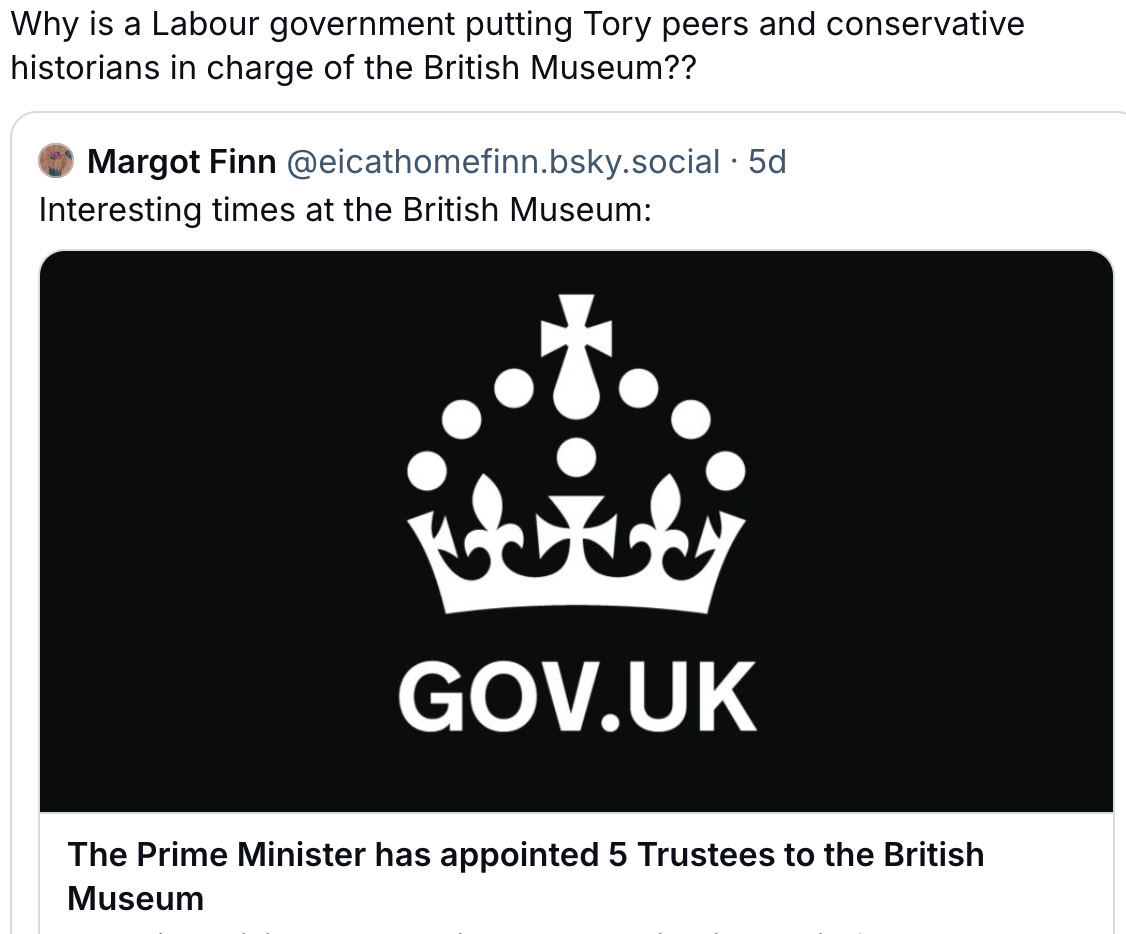When everything is political, nothing is sacred
You shouldn't care if a Labour PM appoints a Tory peer to the British Museum
You couldn’t pay me to visit the British Museum. I think it’s fine for a first date, or if you need the toilet, and I concede the glass roof is quite exquisite. But I’m just not that into Egyptian mummies and Greek sculptures. To be clear, I’m not suggesting they are of little value, or that the people who do enjoy them are exhibiting false consciousness. It’s just not my cup of tea, though I will gladly meet you at the excellent Museum Tavern afterwards for a beverage.
Despite this, I was perturbed by a post on Bluesky this week, pictured above, in which someone asked: “Why is a Labour government putting Tory peers and conservative historians in charge of the British Museum??”
This isn’t about the identities of the new trustees1, though the Tory peer in question, Daniel Finkelstein, is someone whose writing I admire greatly. Indeed, his 2023 book, Hitler, Stalin, Mum and Dad, about Finkelstein’s family’s astonishing story of survival at the hands of both the Nazis and the Soviets, remains one of the most remarkable books of the decade2.
Instead, what bothered me so much was the premise that everything must redound to narrow, party political calculation. Like children silently (or not so silently) itemising the number of birthday presents their siblings receive, waiting to throw a tantrum years later at their university graduation.
I think I was also repulsed by how America-brained it all feels. The idea that public life is a zero sum game, one where each addition to the discourse – whether the latest $300m feature film or some new TikTok craze – moves the needle very slightly to the left or right. It is exhausting and pernicious.
This is not to say that politics is unimportant. Politics is decision-making without violence. Those who wish to extinguish liberal democracy, and replace it with techno-oligarchic-authoritarianism ought to be opposed at every moment with every sinew. But policing who is appointed to a museum is not that. Not everything is political.
I think about this most often in relation to Northern Ireland, where the dominant cleavage is constitutional. That is, people generally vote for parties on the basis of whether they are unionist (wish to remain part of the UK) or nationalist (wish to become part of a united Ireland)3. This is not a criticism, by the way. If one party wants to alter which country I live in – whether I support that change or not – it makes sense for that to dominate over other issues such as health and education.
But it also raises the stakes. As a result, certain things in Northern Ireland, whether flags, marches or songs, feel politicised in a way they may not in Great Britain. Having said that, constitutionalism subsequently spread to Scotland, which for more than a decade has endured a permanent debate over independence, and then to England, over Brexit. Perhaps Northern Ireland was just ahead of the game.
The problem, of course, is that if every election feels existential, if your opponents are a threat to the system as a whole, then perhaps – no, for sure – your side is right to take extreme actions. If you are the Tories, you can lose the 2024 general election to Keir Starmer, regroup and win power four or five years later. But lose a border poll, or an EU referendum, or an election to Donald Trump, and you may not get a second chance.
The stakes are indeed higher right now than they have been for decades. Domestically, the Labour government may get sucked into something of a fiscal doom loop, with stagnant economic growth and spiralling debt repayments, all while the public realm continues to atrophy. Globally, the alliances and norms that underpinned everything from global trade to the idea that countries cannot seize land by force or coercion are fraying. This is no time for apathy. All the more reason not to keep score on the political affiliation, suspected or otherwise, of trustees to the British Museum.
Have a lovely weekend. Emotionally, I’ll be spending mine in Highbury, August 1998.
I gave it a five-star review for the Evening Standard
To the apparent surprise of Karen Bradley, then Secretary of State for Northern Ireland




It is difficult for the Labour Party to appoint Tories for membership of public offices but they do so on merit. The Tory Party would and did vote for a French economist to be head of the International Monetary Fund rather than a former Labour Chancellor. The Tories took power after the 2010 election and started sacking every appointee in every office who had any Labour leaning. Similar to Trump and Musk today in America.
I just had a quick look at the Standard. Still pretty rubbish.